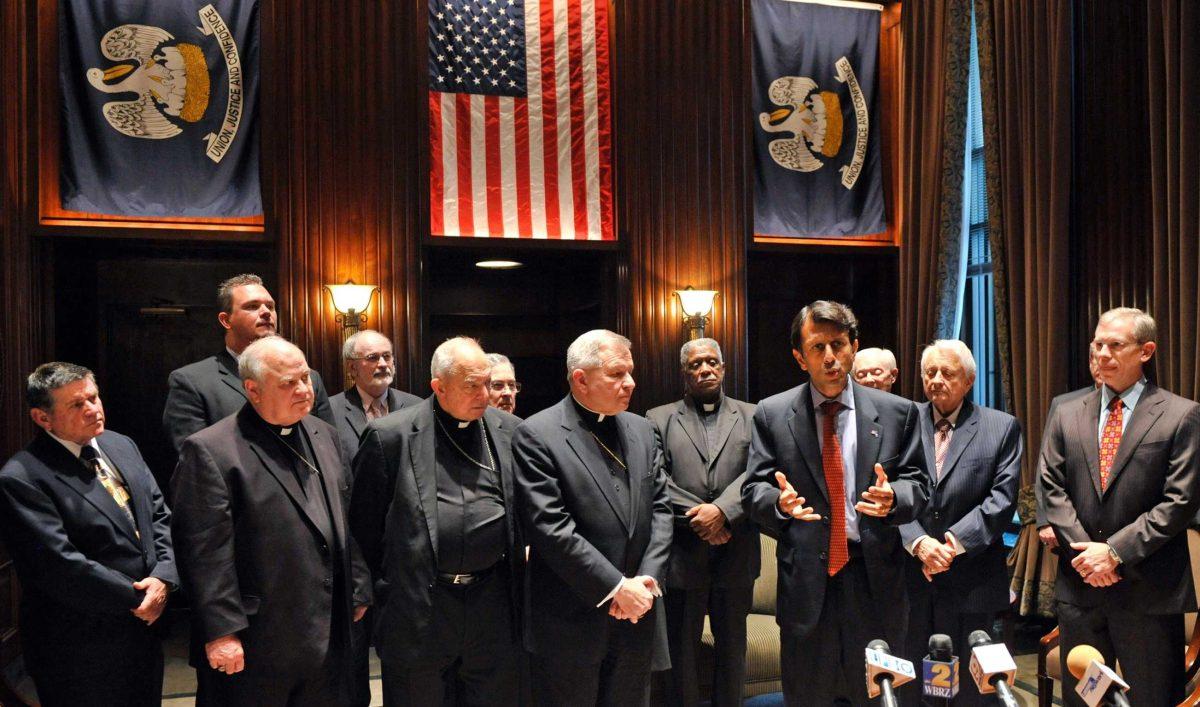On Friday morning, many Louisiana schoolteachers’ fears became reality.
Gov. Bobby Jindal’s education reform plan was pushed through the House of Representatives with a 64-40 vote.
In a column last week, I addressed teachers’ and students’ concerns about the attitude Jindal has expressed toward his constituents, particularly in the education realm.
Most of the feedback I received involved disagreements on one topic: teacher tenure.
Tenure is a system that essentially rewards teachers or professors for good work by providing job security, making it harder for them to be fired.
Jindal’s reform plan will change a number of things, including requirements for tenure. Some believe it should be done away with entirely, while others are fighting to keep tenure as it is.
In the past, Louisiana public school teachers were eligible for tenure after three years of teaching and receiving “satisfactory” assessments based on students’ performance on standardized tests at the end of each year.
At any rate, the previous requirements seem too easy.
Jindal’s education reform will require teachers to be rated as “highly effective” for five years in a row before becoming eligible for tenure.
Ultimately, it will be harder for teachers to receive tenure.
Sounds like a good thing, right? But after researching the topic, it seems the answer of whether tenure should exist is not as clear-cut as we may like.
Tenure began in the late 19th century when teachers demanded protection from parents and administrators who tried to dictate lesson plans. It evolved further during the women’s suffrage movement because women could be fired for getting married or having children.
Today, public school teachers in all states receive tenure after one to seven years on the job.
Before passing judgment, it’s good to distinguish between the two types of tenure.
Tenure for a college professor is slightly different than K-12 tenure because it’s intended to allow professors to research the subjects they want and publish articles that may be against societal norm or administrative values without being fired.
Providing tenure for professors is also an asset for universities because it offers exceptional professors an incentive to stay at the University.
If the University didn’t offer tenure to our professors, we would probably not be able to retain some of our great educators and researchers.
But some argue against tenure for college professors.
Utah Rep. Chris Herrod has said he believes tenure hurts up-and-coming professors’ chances at getting jobs because universities cannot get rid of the old, tenured professors who are “barely there.”
It’s a warranted fear. Just walk through the hallway of any department once a day and you’ll see what Herrod means – some professors never seem to be there.
While there are some concerns about college professors, K-12 tenure is more controversial.
First and foremost, most careers do not have tenure. People have to prove themselves day-in and day-out to keep their jobs.
Tenure essentially allows teachers to slack off without consequence, keeping ineffective teachers employed when better ones may be looking for jobs.
Another criticism is that K-12 tenure is not earned – it’s given to nearly everyone. A 2009 study by the New Teacher Project found less than 1 percent of evaluated teachers were rated “unsatisfactory.” This shows tenure may be too easy to receive.
In light of these reasons, Jindal’s tenure reform seems like a good move, but it’s flawed in some ways.
Jindal’s goal is to better public education in Louisiana. Increasing tenure requirements may help somewhat, but making teachers entirely responsible for students’ performance is not the answer.
Even the most inspiring teacher cannot make every student learn, because some don’t want to – it’s a cultural problem, not a teaching problem.
The teacher evaluation system needs to be based on something more effective than pupils’ test scores, but it should only reward the best.
Here are a few solutions: yearly peer reviews, board reviews, service reviews, extracurricular involvement – the list could keep going.
The reviews should be done to attain and maintain tenure.
Overall, tenure seems more warranted at the college level than K-12, but that doesn’t mean it should end.
Public school teachers provide a service to the state for extremely low pay. It’s a service most would never consider doing, especially those individuals screaming to destroy tenure.
Rewarding the best teachers with tenure is the least we can do.
Chris Grillot is a 20-year-old English and mass communication senior from New Orleans. Follow him on Twitter at TDR_cgrillot.
____
Contact Chris Grillot at cgrillot@lsureveille.com
The C-Section: Good teachers deserve to be rewarded with tenure, but it should be harder to attain
March 27, 2012





